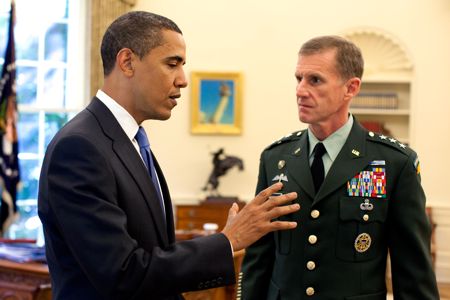 When he was running for President, Barack Obama called Afghanistan the necessary war, in contrast to Iraq. He had to say that to win. Americans might not like being in two wars simultaneously, but if we don’t have any wars going on we feel a slight malaise. Iraq has slipped into a slow boiling civil war as we always knew it would, and we’ve stopped caring, just as they always knew we would. Afghanistan, however, follows a different pattern.
When he was running for President, Barack Obama called Afghanistan the necessary war, in contrast to Iraq. He had to say that to win. Americans might not like being in two wars simultaneously, but if we don’t have any wars going on we feel a slight malaise. Iraq has slipped into a slow boiling civil war as we always knew it would, and we’ve stopped caring, just as they always knew we would. Afghanistan, however, follows a different pattern.
Afghanistan (The name is the Pashtun word for “Mordor.”) is known as “the place empires go to die.” There has been intense lobbying at the Afghani board of tourism for a new slogan, but no dice so far. The Afghanistan invasions of Alexander the Great, Britain, the Soviet Union and (in the least recounted and geographically most ill considered invasion) Peru all eventually met with humiliating defeat and withdrawal. The Afghan’s secret is digging into a rocky terrain no one would ever live in if they weren’t too busy killing invaders to think about it. Really, if we just pulled out and legalized heroin everyone in that country would probably emigrate to London. Then a bunch of goats would take up arms against all invaders.
General McChrystal has issued a gloomy assessment of the Afghan conflict, dooming it to failure without the addition of 40,000 more troops. McChrystal is widely respected, but not infallible: he was behind the disastrous marketing in the late 80’s of McChrystal Light, a powdered beer marketed to the Irish as a Pentagon pacification program.
So now the choices are stark. It’s either “all in, or all out” as several commentators have said, even though there aren’t the troops to go all in, and no one’s really suggesting we withdraw all our troops, making that formulation an oversimplification of mongoloid dimensions. It could be argued that we would have to go all out to go all in, or that we have to go all in order to get all out. Or we could focus on the actual logistics of war rather than the linguistics of spin. You like that logistics/linguistics thing? Pretty smart, huh? I must know a lot about Afghanistan.
Joe Biden wants a scaled back approach using predator drones, because nothing wins over a population like death from above delivered by flying robots. Secretary of State Hillary might be more hawkish, but she shrouds her opinions in State-speak, popping B complex vitamins and watching her cholesterol, in hopes of running against this war, which will no doubt still be raging in 2016.
The one person it’s hard to read is the President himself. He talked tough on Afghanistan in 2008, while being an anti-war candidate. The public’s sick of the war, especially Democrats, but any downsizing of the mission will be relentlessly portrayed as weakness by the opposition. This is the same opposition that was behind a six year and counting distraction in Iraq, which killed a ton of people all because W had daddy issues, so that opposition is as qualified to argue foreign policy as a retarded gerbil with rabies.
In a long neglected war where the options all look bad, how much will politics affect a decision about human lives? Can we leave the women of Afghanistan to the mercy of the Taliban? Does the corrupt and ineffectual Karzai government merit the investing of nation building? Would a resurgent Afghan Taliban undermine nuclear Pakistan’s gains against the Pakistani Taliban, or are those two Taliban’s on two different missions?
Will Obama be taking a political hit for the sake of our soldiers, dying for a pile of rocks, or will he be abandoning a vital mission for political expediency? Personally, I trust the guy to make the right decision. I also don’t see how anyone could know what the right decision is. So let’s go back to linguistics. Obama should “Go long and go low.” Someone needs to set some sort of strategy to that phrase. I don’t know what it means.
-- Dan Kilian





The dilemma is that current forces deployed where the Taliban, as per the "anti-terrorist" strategy, can not be redeployed under a new "counter-insurgency" strategy without leaving current allies high and dry and doomed to die at the hands of the Taliban as soon as our troops leave. If we were to do this, there wouldn't many people anywhere in Afghanistan willing to be allied with us.
ReplyDeleteAs far as the opium trade goes, it does make sense to provide a legal avenue for this all important staple of the Afghan economy. The European Parliament as proposed doing this. The U.S. should follow suit. We would still need to deploy troops to defend against the opium war lords who prefer selling to the black market and have the means to enforce their preference with deadly force.